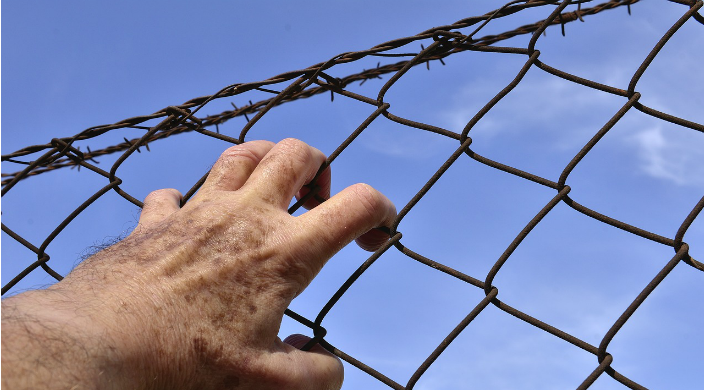
As I watch human tragedies unfold on the U.S.-Mexican border and elsewhere, nothing is helping me more right now than a conversation I had on my radio show On Being with literary historian and author Lyndsey Stonebridge, who channels the thinking of the 20th-century Jewish philosopher Hannah Arendt.
Lyndsey is a professor of modern literature and history at the University of East Anglia in Norfolk, England. She’s the author of The Judicial Imagination: Writing after Nuremberg as well as the essay “Thinking Without Banisters” for Jewish Quarterly magazine.
Here’s a snippet of my conversation with Lyndsey.
Krista Tippett: How might Hannah Arendt have looked at the condition of refugees today, having herself fled from Germany and been stateless for 18 years before becoming an American citizen?
Stonebridge: I think she would say it is actually part of a continuous history, and that it isn’t just a problem for people who happen to be refugees. It’s a problem about how we’re deciding to run our countries and our politics.
She understood that humanitarianism or human rights would not be the answer to the question posed by people who, for whatever reason, find themselves stateless. Human rights, in her view, are actually political and national rights. So you only have as many rights as are guarded by the country in which you happened to be born.
If a country decides that you are no longer a citizen and the state has no more responsibilities towards you, you are “rightless.” She said very famously, “The world found nothing sacred in the abstract nakedness of being human.”
In The Origins of Totalitarianism, Arendt wrote, you no longer have rights as you disappear into “the dark background of difference,” where the more interconnected the world gets, the more global it gets, the bigger the dark background of difference will get.
Tippett: What, then, is her answer to those who find themselves unprotected and vulnerable?
Stonebridge: In The Human Condition, Arendt borrows from Herodotus the term “isonomia,” which is the principle of equal liberty.
Basically, it says, “Well, how come I’ve got total freedom of movement and you haven’t? How come my child gets a really good education and yours doesn’t? How come my mom can grow vegetables in her garden, and your mother’s garden’s just been blown to bits? That’s not good enough.”
You need to have a political community of citizens that is capable of acting on this principle of equal liberty.
Tippett: In her essay “Lying in Politics,” Arendt says: “Factual truths are never compellingly true. Facts need testimony to be a remembered and trustworthy domain of human affairs. From this, it follows that no factual statement can ever be beyond doubt.” Take us inside that and what that means for us now.
Stonebridge: She’s saying you can throw all the facts you like at people, and they will not stick. To make truth meaningful in the world, it has to happen through discourse between people who acknowledge reality.
I’m reminded of when Arendt went back to Germany to collect the Lessing Prize. In her acceptance speech she said, “I’m talking to you as a Jewish person. You need to take that on board.” She went on to say, it would not have been helpful during the Third Reich to say, “Jews and Germans are part of the same humanity. We all love each other.” Doing so would have been to totally disregard the reality that you were living in a political system that says that one of you is not.
Ignoring the reality of racial politics makes the idea of a shared humanism impossible. But sitting down together and perhaps reading a text together offers the possibility of a shared humanism.
Tippett: The Origins of Totalitarianism ends with these hopeful words: “But there remains also the truth that every end in history necessarily contains a new beginning.” Where did Hannah Arendt see new beginnings?
Stonebridge: Looking in her teaching file really brought home to me the importance of her students, whom she called “the new people.”
She believed very strongly in the affirmation of teaching, of listening to students, of empowering students, of making it possible for students to create their new ideas of citizenship.
Out of the darkest times there can be a new beginning. And those of us who work in universities need to step back and shut up, sometimes, and do the most we can to make sure that happens.
To learn more about the Reform Jewish commuity's work around the refugee crisis, please visit www.rac.org/refugees.
This interview was adapted from On Being with Krista Tippett, now heard on over 400 public radio stations and a successful podcast produced by On Being Studios, together with the On Being Blog, initiatives like the Poetry Radio Project and Public Theology Reimagined, and an expanding portfolio of new podcasts including This Movie Changed Me.
Related Posts

Harnessing the Power of our Mothers Around the Seder Table

Melding Tradition and Innovation: Our Interfaith Toddler Naming Ceremony

